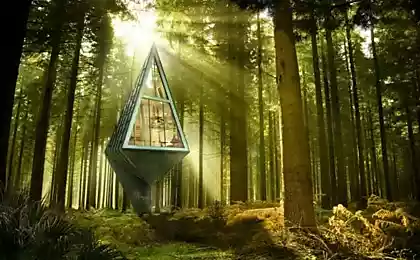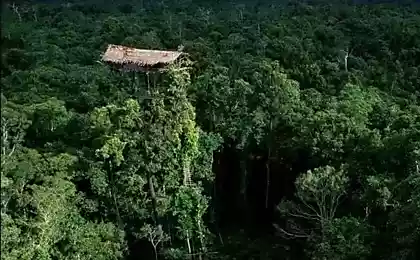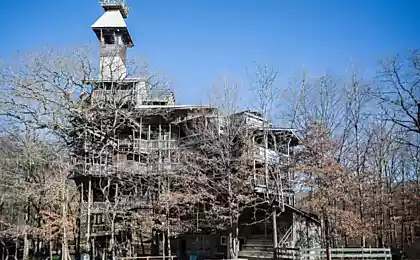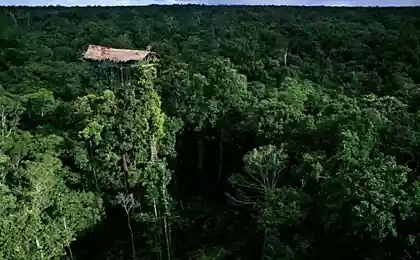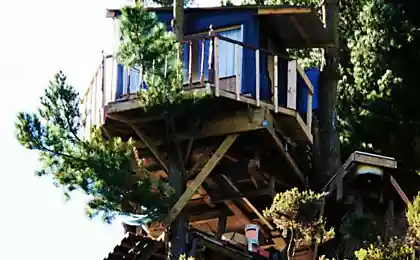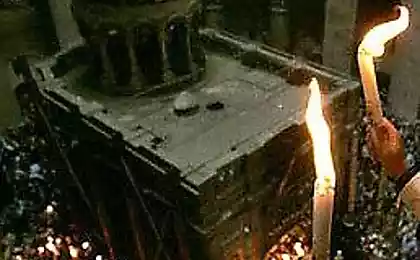2111
The life of a man from a tree (25 photos)
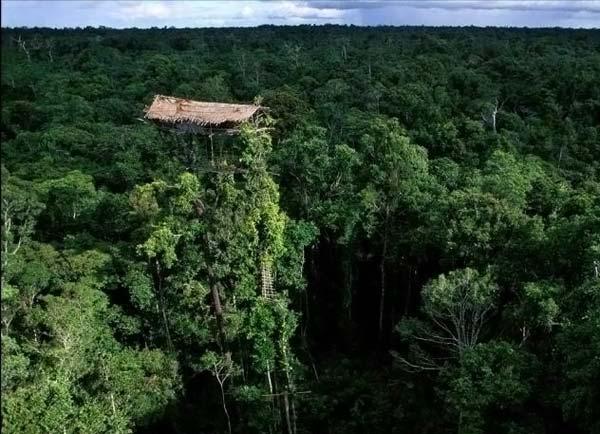
They say that people or the ancestors of people once lived in the trees. At least in some places. It is clear that the Chukchi and Aleuts, for example, the trees could not live in the absence thereof. But I as a child lived in the trees regularly. We are teammates, even something like a lodge in the branches several times built. Stupid anti-evolutionists sometimes say that, they say, "even wild and feral tribes do not live in trees, as do monkeys who tipped us to the ancestors." What can we say to such people? Here's what: "Lord, you know little, a little reading and unobservant." All children who are in the personal development of its repeated development of the human species, live in trees. At least - at the bottom of the fork plum tree is not would call Grandma to dinner. A look at the first picture on this post. Click on it to see details. See? This modern home Papuan tribal people korouai. And it - high on the tree.
Among the tribes still living on trees and korouai kombai - the most famous. Probably because they live in fact very high. Clearly, it is one thing to raise the home on stilts, or even trunks of natural trees over six meters underground, and vpendyurit it here on this height - quite different:
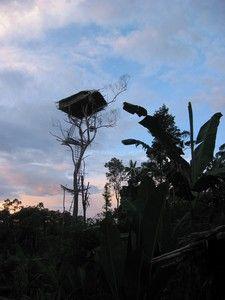
Comrade brings home a dog with a walk:
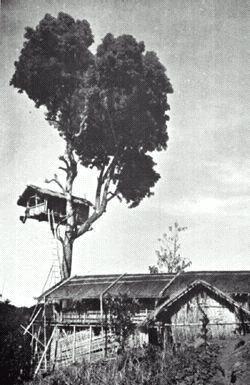
More houses:

By the way, deviate for a moment from the subject, the tribe korouai remarkable not only for its houses. Like many savages korouai almost nothing to bear the clothes, doing the bare minimum. So, at least, which bypasses the men of the tribe, even clothing can not be called - they are very intricately packed its members with the help of one or two verёvochek or even without them, so to speak, is not stuck. And yet. I wonder what happens to the term in this package, if uh ... the media, so to speak, suddenly catches up with an erection? Hmm ...
Okay, back to their homes in the trees.
Kombai and korouai - one of the wildest, perhaps, tribes in the world. Malay folk Semanggi (Ngong) today already live mostly on the ground, in extreme cases - in the pile houses. But not so long ago, they also lived in trees. Photos wood homes Semanggi I have not found, but almost charcoal - on high stilts in the trees:
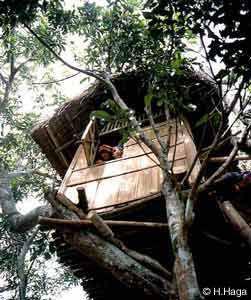
The tree house is quite civilized (compared to korouai) Philippine tribe bagobo:
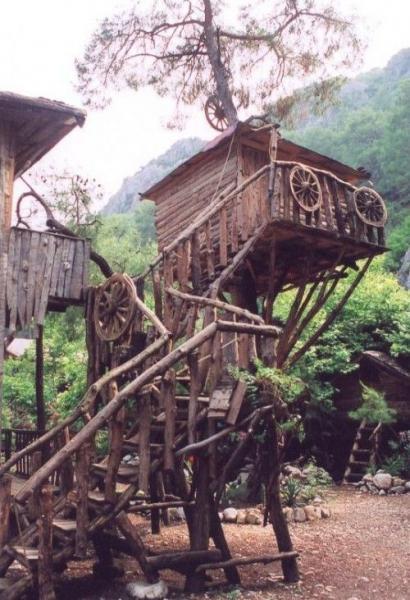
In Turkey, Olympos, tourists are offered for living houses, hotels on the trees:
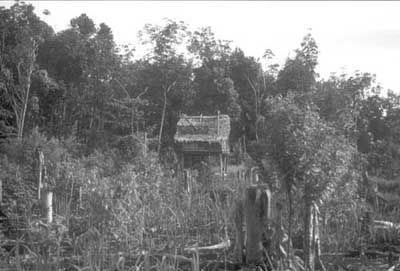
Pulls back to the trees and the Japanese. For example, a restaurant at the entrance to the park Onoyama in Okinawa:
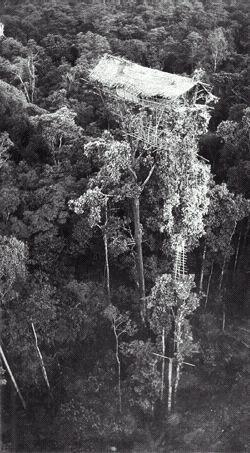
Japanese architect Terunobu Fujimori built himself on a tree fairy tea house:
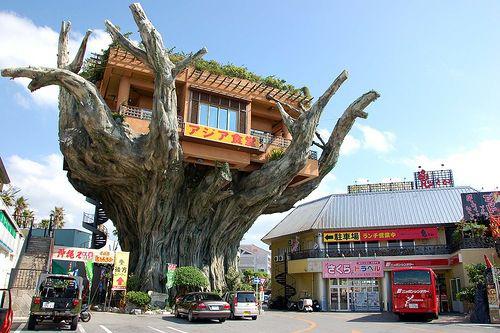
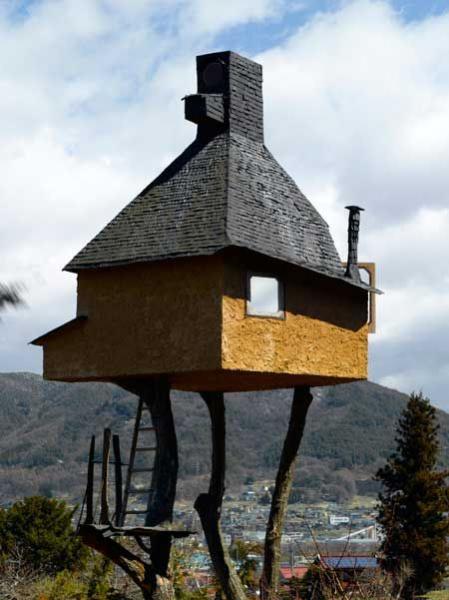
House stands in Nagano Prefecture and is named Takasugi-an - "very high tea house." It was built in fact on the tree. Or rather - the trees - in the trunks of two old chestnuts, excavated, though elsewhere and brought to the site specifically.
Here is an inside-Takasugi:
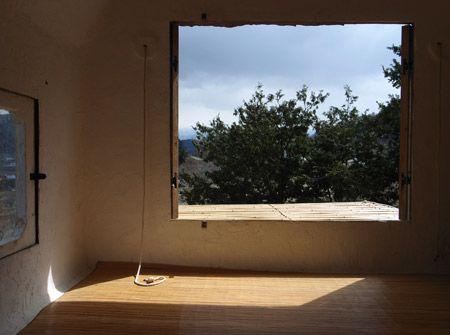
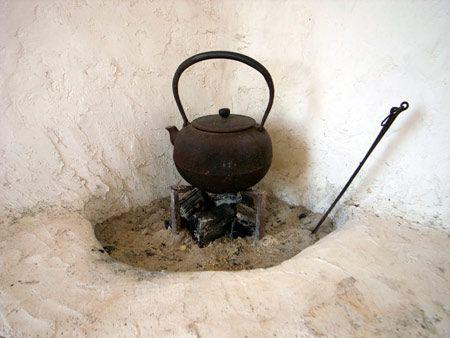
And here is the master Terunobu Fujimori prepares tea:
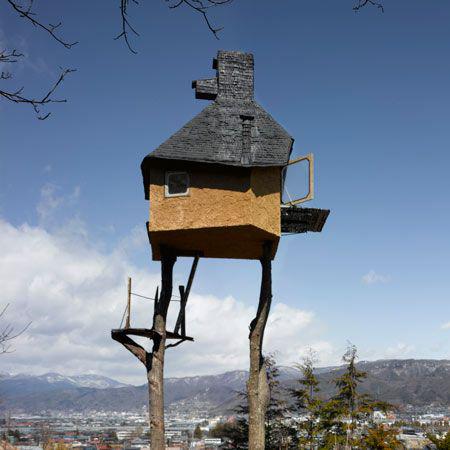
Japanese architecture and is generally considered environmentally friendly, even a stamp exists in okolokulturologicheskoy environment - "eco-friendly Japanese architecture". But this house stands out even against the backdrop of Japanese architecture - back to nature, to the roots to the crown, to the childhood of mankind ... Before you do the actual architecture, Mr. Fujimori was its historian and fotoletopistsev. And interest his first masterpieces of the discharge, so to say, the creation of an unknown architect. He studied the ancient buildings - the time when people have not come up with the architecture and just create itself out of scrap materials refuge from the cold and rain. And yet Fujimori and his supporters, united in a group ROJO Roadway Observation Society, traveled to Japan and photographed "roadside architecture" - buildings, the creation of which has not had a hand in no architect. In the end, inspired by his research, Fujimori began to design and build itself - made of wood, charcoal, earth, stone and other natural materials rough. And, in my opinion, quite successfully.
And here again the restaurant. But this time in New Zealand. Called Yellow Treehouse (Yellow tree house):
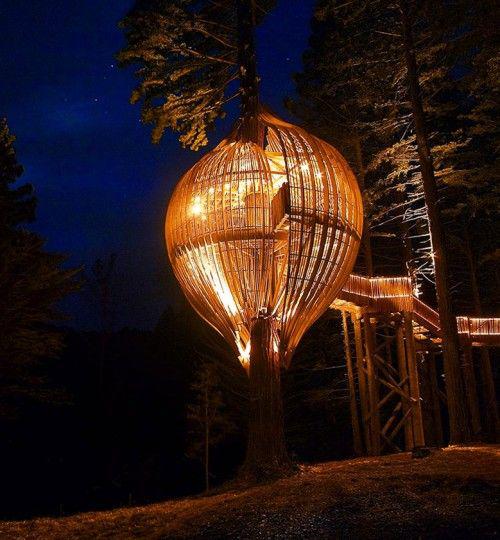
In Russian, the phrase "yellow house" means the first, perhaps, of all psychiatric hospital. Interestingly, in New Zealand there is something similar? Hmm ... Restaurant "Yellow tree house" is fixed on a strong tree trunk at a height of 10 meters. Not too high in general.
Restaurant by day:
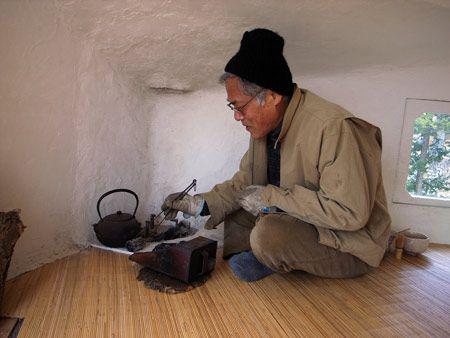
Interior:
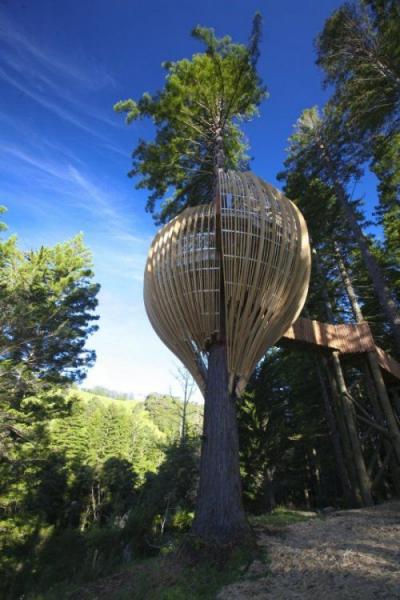
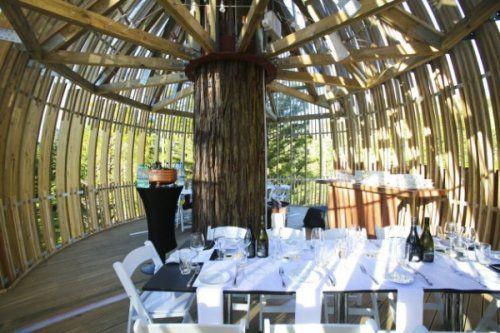
But - "Free Spirit Sphere» (Free Spirit Spheres) - development of Canadian designer Tom Chadleya (Tom Chudleigh):
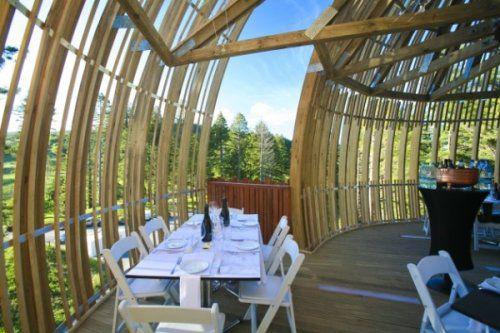
This damn thing is easily transported on a trailer, and a conventional suspended to all three pillars strong enough.
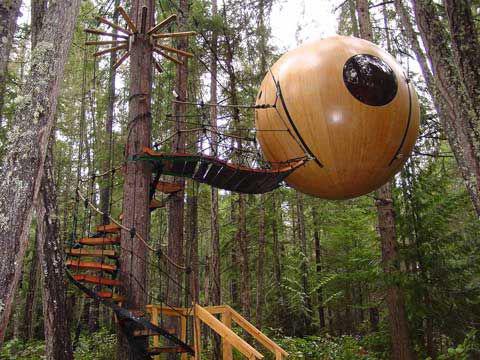

It can be used instead of a tent in a relatively long forays into the countryside. The internal equipment of "Free Spirit Sphere" is focused on the free spirit of a Western-style - it has a refrigerator, microwave, electric heating. The interior of the sphere looks like:
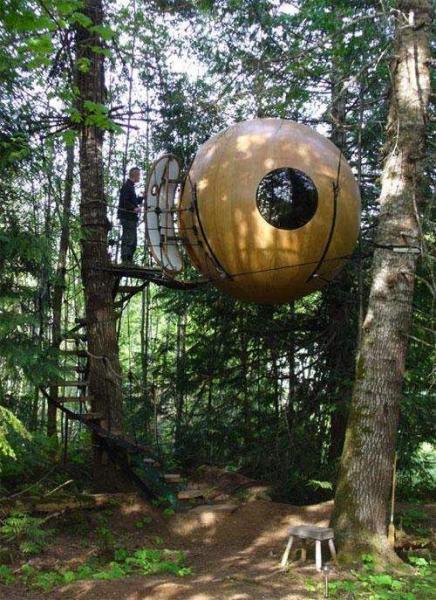
Tom Chudleigh, by the way, sells these areas. At 35-150 thousand dollars.
Baumraum German company designs and builds tree houses throughout Europe. Here is one of their creations:
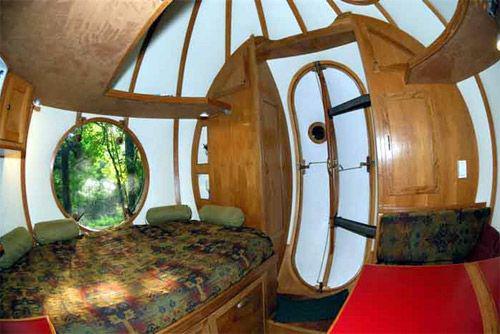
Finally, the world's largest tree house is in England, in the county of Northumberland, in the gardens of Alnwick. Its area is 557 and a half square meters (6000 square feet), it settled on a 120-seat restaurant, shop and two classrooms.
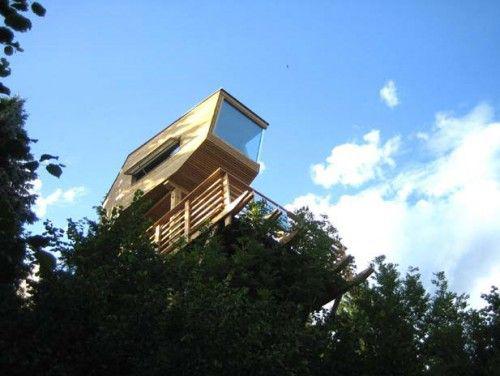
So we, too, - the newspaper "Soviet" (distributed in Protvino, Pushchino and Serpukhov) for October 11, 2006 wrote:
Imagine people living in the trees, there are Serpukhov. Their homes you see in the photos, which were made in the streets and the street Krupskaya Rakova. Generally, in this way in Serpukhov love to entertain teenagers. For example, the "tree house" outside Rakova initially built of local youngsters. But then, they say, housing has attracted the local homeless. Those distribute the wood harvested in the trashcan trash and do not hesitate to leave under the tree "products of its life activity." So now the boys come to disdain built their "house". But who and how to live in the "high-rise" on a tree in the yard on the street. Krupskaya, could not figure out.
Well, who else is willing to say that people do not live in trees?
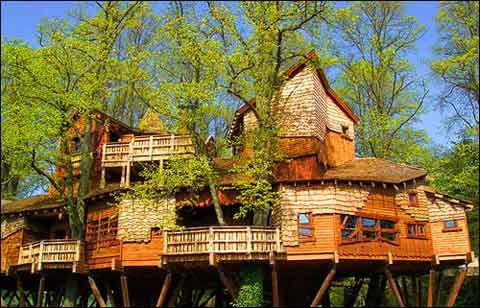
©

